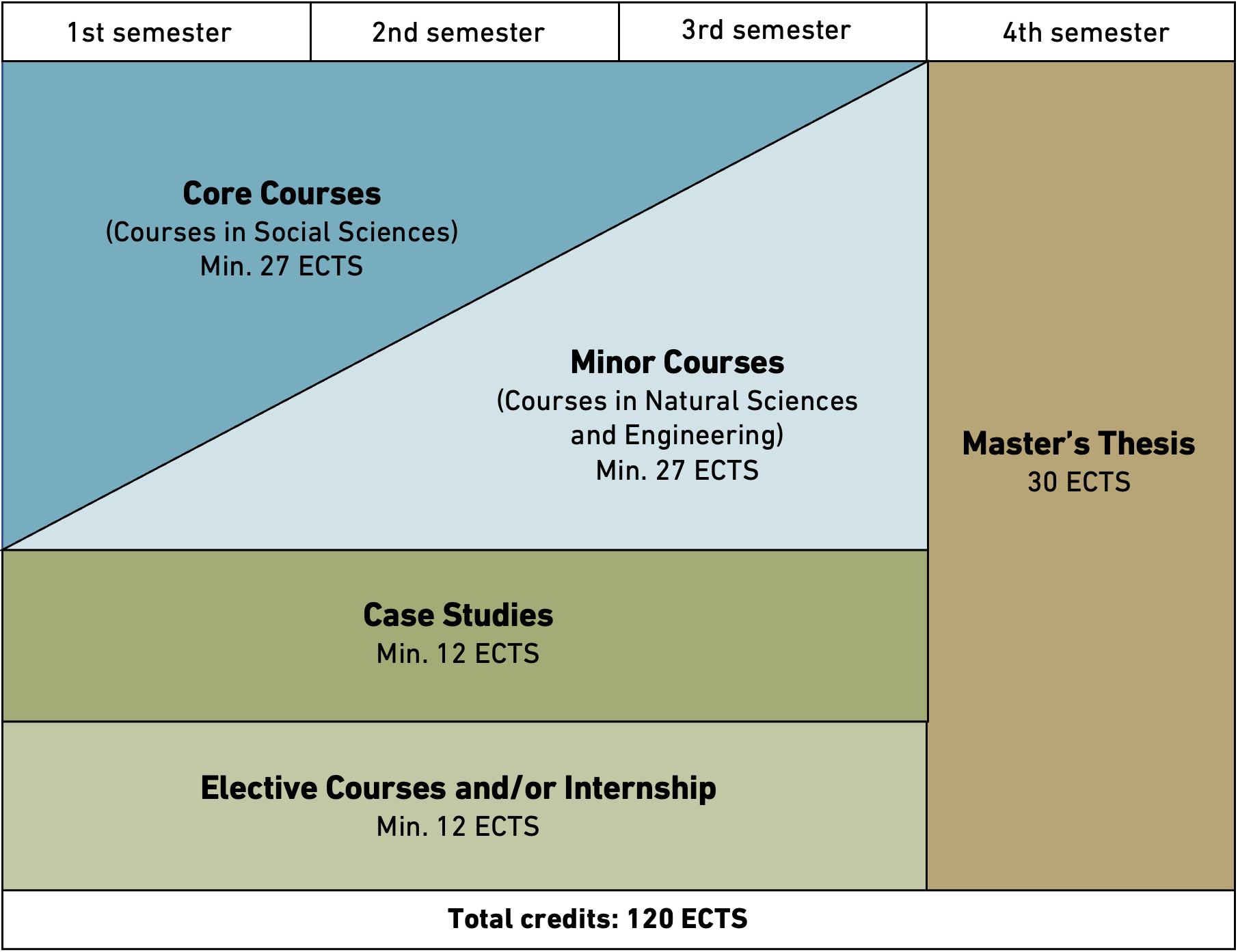Courses
The MSc in Science, Technology and Policy is a full-time specialised interdisciplinary Master's degree programme.

A variety of courses linking the different disciplines and providing a broad spectrum of expertise are offered to our STP Master's students. All courses are taught in English.
The core courses impart content and methods central to the course of study, primarily on policy analysis and evaluation, as well as on economic, social and political processes and institutions.
Mininum credits: 27 ECTS

The minors go beyond the foundations provided in the Bachelor’s degree programme to deepen subject knowledge and methodology in the specialist area. Every minor offers courses in both methodology and thematic content.
Mininum credits: 27 ECTS
Case studies focus on using the knowledge gained in the core and minor courses to further investigate the interdependencies between the natural or engineering sciences and the political as well as social sciences.
The Download Case Study Guidelines can be downloaded here (PDF, 93 KB).
Mininum credits: 12 ECTS
The electives serve to consolidate the subject knowledge specific to the degree programme and extend knowledge in the social sciences, humanities and other disciplines. An optional internship in a public or private institution can also be part of the elective courses.
Mininum credits: 12 ECTS
The internship is a voluntary part of the MSc curriculum. It aims at making students familiar with policy analysis in a real-world setting, for instance in a government agency, a NGO, a regulatory or public affairs division of a private sector firm, or a consulting firm focused on policy analysis.
The programme offers two different options:
- A short internship which corresponds to a workload of 180 working hours, is to be completed within 3 months (6 ECTS points).
- A long internship which corresponds to a workload of 360 working hours, is to be completed within 6 months (12 ECTS points).
With the Master’s thesis, students demonstrate their ability to conduct independent scientific work. Students have six months to complete the Master’s thesis, which is equivalent to a full-time semester workload.
30 ECTS
More information on the thesis and the guidelines can be found on the STP Master's Thesis Page.
Below you can find the list of Core Courses, Minor Courses, Electives and Case Studies that are offered in the ongoing semester respectively were offered in the semester before.
The lists of courses in the electives and minor categories are incomplete. Students can choose other courses upon approval by the Director of Studies. For the acceptance of further courses, students need to send a request to the student office.
Sustainability Course Catalogue
ETH sustainability provides a list of courses relating to the UN Sustainable Development Goals and sustainability at large.
Additional information
The language of instruction is English.
The duration of the studies is four semester, which equals two years. The maximum permitted duration of studies is four years.
The Academic title is Master of Science ETH in Science, Technology and Policy.
Abbreviated form: MSc ETH
120 ECTS in total.
One credit corresponds to a workload of 30 hours. The workload includes all course-related activities required to obtain credits.
The curriculum is designed in such a way that full-time students can acquire an average of 30 credits per semester.
Students of this degree programme may not take part in an ETH Zurich exchange programme. Individual exchange stays are possible, but mobility credits will in no case be recognised towards the Master’s degree.
Performance assessment is decided by each lecturer depending on the course goals. All course assessments can be found in the course catalogue. To learn more about different performance assessment types, take a look at ETH's official performance assessment page. Additionally, the ETH Guidelines on Grading Written Examinations can be found here.
If you wish to appeal ETH decisions (such as admissions decisions, grades, disability compensation etc.), see the ETH official Legal Action webpage.